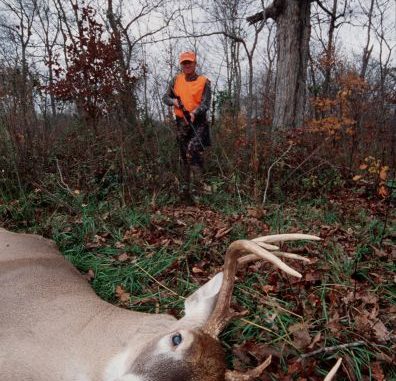
Louisiana Hunters for the Hungry push bills at Legislature after donated meat discarded.
For 20 years, the Louisiana Hunters for the Hungry program has been a shining beacon for those who do with less, or sometimes do without. It’s a fairly easy match – coupling Louisiana’s large hunting population with the Bayou State’s tens of thousands who, without the generosity of others, could go hungry on any given night.
Since 1993, hunters who have extra game meat bring the food to participating processors. Within days, those processors would have the meat ready for consumption by Louisiana’s people with needs. The meat, mostly venison, is delivered to soup kitchens, shelters, churches and such to be added to stews, soups and casseroles.
Estimates are that Hunters for the Hungry donated more than 60,000 venison meals this hunting season alone and, since its inception, has brought to area tables more than 75 tons of meat, including deer, hog and an assortment of other proteins collected on the group’s hallmark “Clean Out the Freezer Days.”
In other words, it’s been a win-win situation for all.
Now, Hunters for the Hungry co-founder Richard Campbell is stomping for two pieces of legislation that have been introduced to state legislators in Baton Rouge. He says the two Senate Bills also are a win-win for Louisiana hunters and for the state’s needy.
The prospects come in the form of Senate Bills 58 and 84, and each tackle a legislative linchpin for the charitable program.
SB 58 attempts to codify the capabilities of groups like Hunters for the Hungry to deliver game meat to charitable organizations. SB 84 is a blueprint for allowing the group to use processors from throughout the state to deliver the meat to the same charitable groups.
Senate Bill 58 is written in very “cut and dried” wording by attorney Christopher D. Adams ,and the state legislative Web site digests it as “Proposed law allows a not-for-profit entity or a charitable organization to receive or use any commercial or game fish, migratory and resident game bird, game quadruped, as defined in R.S. 56:8, alligator, or feral hog in food or meal distribution at no cost to an individual.”
Campbell refers to it as “The Shreveport Bill,” because of an unfortunate situation that recently occurred there when state officials forced meat donated by Hunters for the Hungry to a local soup kitchen to be dumped. This happened after it was determined that such shelters fall under the same umbrella as state restaurants — at least as they currently are seen in Department of Health and Hospitals terms.
That meant, quite simply, that venison could not be served in a shelter, just as it is not allowed to be served in a restaurant operating in the state.
Consequently, the meat was destroyed, which was seen as an enormous waste by Campbell and company at Hunters for the Hungry.
“The proposed bill … codifie(s) in eight lines what we’ve been doing for 20 years,” Campbell said. “(Adams) really deserves a pat on the back. It could have been an ugly situation. We didn’t want to run the processors off.”
The absolute opposite appears to have happened, in fact. Campbell said processors from all corners of the state are interested in participating in the Hunters for the Hungry program. However, the organization currently is hamstrung to include only meat processors from Northeast and Central Louisiana.
SB 84 would allow willing processors from across Louisiana to take part in the giving process.
The bill also would institute a check-off program to “allow sportsmen the opportunity to voluntarily donate dollars to Hunters for the Hungry when they purchase their hunting and fishing licenses. The donated funds will be used for processing of game for the hungry and for raising awareness of Hunters for the Hungry programs.”
Campbell said his group has 60 to 80 processors from across Louisiana who want to assist in feeding the needy.
“We’ve been talking about this check-off for a long time,” he said. “Other states are doing it, and others are talking about doing it.”
He gave a simple example of how the program would work for all.
“Say you hunt north of Ferriday and you kill three deer, you and your buddies, but you can only use two,” Campbell said. “You give one to the hungry. Right down the road is a processor you can give the other deer to. He processes the meat and within a couple days, it will be feeding the hungry.
“We have people like that all over the state who want to help. They’re waiting on this —waiting on me, waiting on this bill.”
Hunters for the Hungry pays $40 per deer to meat processors. That money comes from donations Hunters for the Hungry solicits, and could come from the check-off, as well.
“We want the processor to smile when he sees you coming in with a deer that will feed the hungry,” Campbell said.
Campbell said he’s not sure when the bills will be heard, though SB 58 has been referred to the Committee on Health and Welfare. The bill was sponsored by Sen. Sherri Smith Buffington, and Rep. Jeff Thompson is handling the bill in the House, Campbell said. SB 84 was sponsored by Sen. Neil Riser and has been referred to the Committee on Natural Resources.
Campbell said he has heard no opposition to either bill and believes the passage of both will bolster his group’s mission.
“Hunters for the Hungry has done a lot of good,” he said. “And, it’s only going to get better.”
Telling your legislators you want to help feed the hungry is as easy as logging onto www.hunters4hungrylouisiana.org.
From there, you can click on the group’s Facebook page and use an interactive map to contact your state legislators to tell them you want them to support SB 58 and SB 84.


